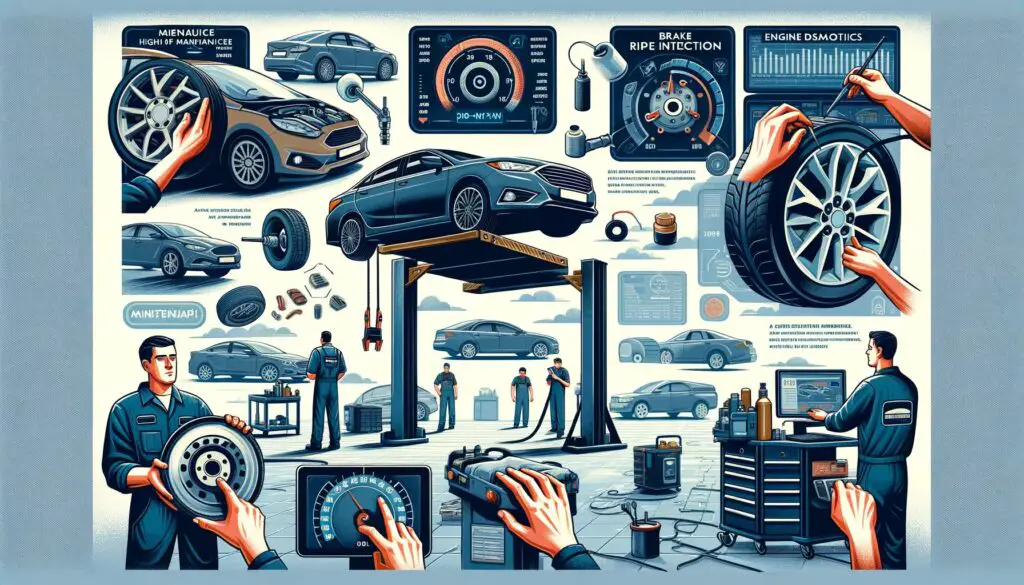In today’s automotive landscape, high mileage vehicles are becoming increasingly common due to advancements in engineering and technology. Understanding the importance of regular maintenance for these vehicles is crucial in maximizing their longevity and performance.
I. The Milestone Markers: Understanding High Mileage
High mileage, typically defined as vehicles surpassing 100,000 miles, requires a shift in maintenance focus. However, modern vehicles are designed with durability in mind, capable of lasting well beyond this milestone with proper care.
II. Initial Assessment and Setup
Before establishing a maintenance schedule, a thorough inspection is essential. Key areas to assess include engine health, transmission condition, cooling system integrity, brake functionality, tire wear, and electrical system performance. Personalized maintenance schedules should be tailored to individual vehicle types and usage patterns.
III. Regular Maintenance Tasks
Engine Care
Routine oil and filter changes are paramount for preserving engine health in high mileage vehicles. Additionally, maintaining spark plugs and the ignition system ensures optimal performance and fuel efficiency.
Transmission Maintenance
Regular fluid replacements and vigilant monitoring of transmission wear signs are crucial for preventing costly repairs. Timely transmission filter replacements further contribute to prolonged transmission lifespan.
Cooling System
Regular coolant flushes are vital for preventing overheating and engine damage. Periodically inspecting and replacing hoses and the thermostat help maintain cooling system efficiency.
Brake System
Frequent inspection of brake pads and timely replacement when worn is essential for safe vehicle operation. Regular changes of brake fluid preserve braking system integrity.
IV. Periodic Checks and Balances
Tire Maintenance and Rotation
Regular tire rotations promote even wear, extending tire lifespan and enhancing vehicle safety. Understanding alignment principles aids in preserving tire integrity in high mileage vehicles.
Suspension and Steering System
Inspecting shock absorbers, struts, and tie rods for wear helps maintain stability and handling. Regular checks of power steering fluid ensure responsive steering control.
Battery and Electrical System
Periodic battery testing and replacement following manufacturer guidelines prevent unexpected failures. Monitoring alternator and starter function ensures a reliable electrical system.
V. Special Considerations for High Mileage Vehicles
Addressing engine and transmission wear with appropriate additives and treatments can mitigate further deterioration. Implementing rust prevention measures and investing in quality parts contribute to vehicle longevity.
VI. Advanced Maintenance Strategies
Utilizing diagnostic tools and software facilitates in-depth analysis, aiding in early issue detection. Understanding and resetting maintenance lights and messages ensure timely attention to vehicle needs.
VII. Seasonal Maintenance Tips
Preparing high mileage vehicles for seasonal changes is crucial. Winter readiness involves checking antifreeze levels and ensuring tire traction, while summer maintenance focuses on cooling system efficiency and battery health.
VIII. Troubleshooting Common Issues in High Mileage Vehicles
Identifying and addressing common problems promptly prevents escalation. Knowing when to DIY and when to seek professional assistance saves time and resources.
IX. The Role of Professional Maintenance
Selecting a reputable mechanic experienced in high mileage vehicle care is essential. Budgeting for maintenance costs ensures proactive upkeep without financial strain.
X. Enhancing Your Vehicle’s Life: Additional Tips and Tricks
Driving habits significantly impact vehicle longevity; adopting fuel-efficient driving practices conserves resources. Leveraging technology and apps for maintenance tracking enhances efficiency and convenience.
Frequently Asked Questions (FAQs)
- Maintenance Frequency: High mileage vehicles should undergo maintenance as per manufacturer recommendations, typically every 3,000 to 5,000 miles.
- High Mileage Oils: Specialized high mileage oils contain additives that benefit older engines, providing enhanced protection against wear and deposits.
- Signs of Immediate Attention: Unusual noises, fluid leaks, warning lights, and performance issues indicate immediate attention is needed for high mileage vehicles.
- Extending Vehicle Life: Diligent maintenance and proactive repairs can extend a high mileage vehicle’s lifespan well beyond manufacturer projections.
- Finding a Reliable Mechanic: Seek referrals, read reviews, and interview mechanics to find a trustworthy professional for high mileage vehicle maintenance.
Conclusion
In conclusion, prioritizing regular maintenance tailored to the needs of high mileage vehicles is paramount for maximizing their longevity and reliability. By investing time and resources into proactive care, owners can enjoy the lasting benefits of a well-maintained vehicle.
Call to Action
We invite readers to share their own high mileage vehicle maintenance tips and experiences. Subscribe to our newsletter for in-depth guides and expert maintenance advice tailored to your vehicle’s needs





